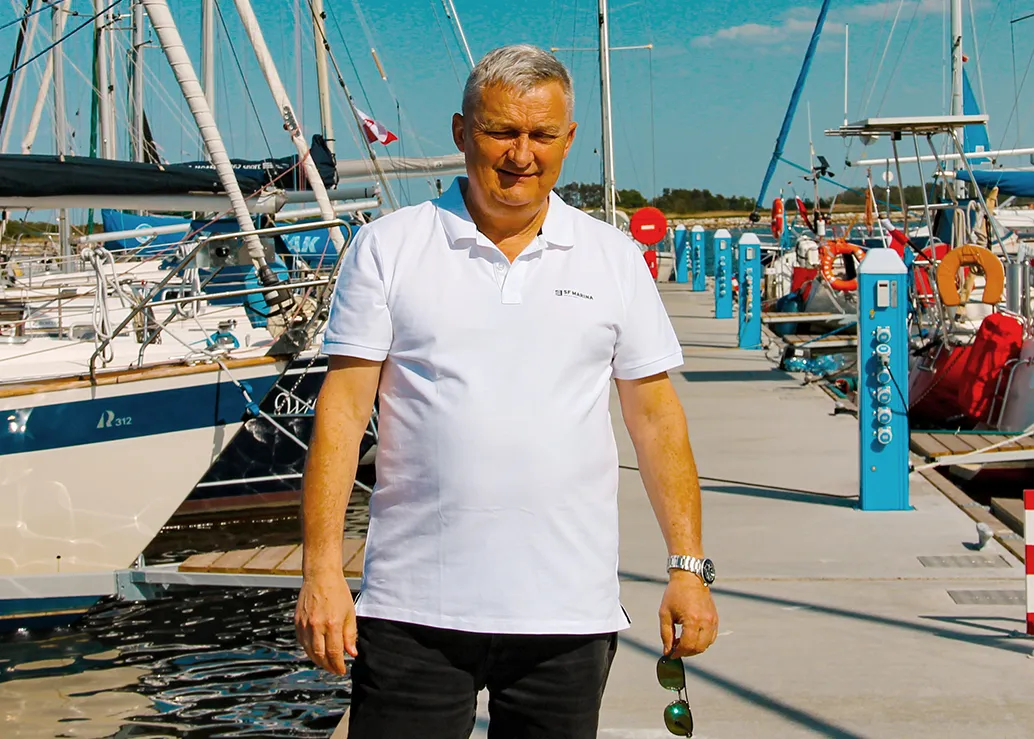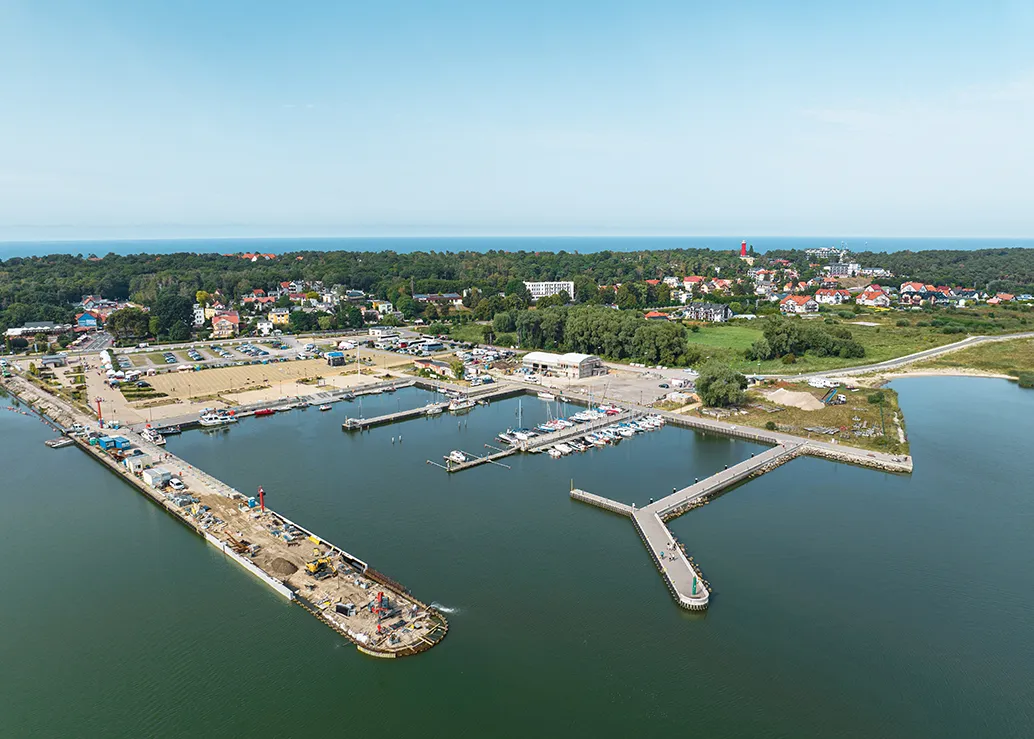Λαμπρό μέλλον για τα έργα μαρίνας στην Πολωνία
"Αρχικά, δεν είχα καμία πρόθεση να δουλέψω με ποντόνια. Ως εκπαιδευμένος μηχανικός, μου άρεσε να ταξιδεύω και να εργάζομαι σε όλο τον κόσμο. Ο πατέρας μου, γνωστός υδροτεχνίτης, πέρασε 45 χρόνια στην κατασκευή αναχωμάτων καναλιών και ταμιευτήρων και λιμανιών. Αργότερα, ξεκίνησε τη δική του μικρή επιχείρηση, Marine System, συνεργαζόμενος με την SF Marina για την κατασκευή της Μαρίνας Gdańsk στον ποταμό Motława και του λιμανιού σκαφών αναψυχής στη Łeba, πριν από σχεδόν τρεις δεκαετίες. Ανησυχώντας μήπως μετακομίσω όπως ο αδελφός μου, ο οποίος εγκαταστάθηκε στον Καναδά, ο πατέρας μου με έπεισε να ενταχθώ στην οικογενειακή επιχείρηση το 1996", λέει ο Piotr.
"Η ιδέα παραμένει η ίδια: συνεργασία με την SF Marina για τον συνδυασμό σουηδικής και πολωνικής τεχνογνωσίας για την κάλυψη των αναγκών των πελατών. Συνεργαζόμενοι με τοπικούς συμβούλους όπως η Wuprohyd, η Ingeo και η Projmors, μαζί με αξιόλογους Πολωνούς εργολάβους, προσφέρουμε λύσεις "με το κλειδί στο χέρι" από τη σύλληψη της ιδέας έως τις πλήρως λειτουργικές μαρίνες, με εγγυήσεις, εγγυήσεις ποιότητας και πιστοποιήσεις ασφαλείας".
Η ακτογραμμή 500 χιλιομέτρων της Πολωνίας κατά μήκος της Βαλτικής Θάλασσας, που εκτείνεται από τον κόλπο της Πομερανίας στα δυτικά έως τον κόλπο του Γκντανσκ στα ανατολικά, διαθέτει αμμώδεις παραλίες και βράχους, αλλά δεν διαθέτει φυσικά λιμάνια. Παρόλα αυτά, η ακτή φιλοξενεί πέντε μεγάλα λιμάνια και 16 μαρίνες, με αρκετές να βρίσκονται κατά μήκος μεγάλων ποταμών, εύκολα προσβάσιμες από τη θάλασσα.
"Η Πολωνία έχει μια ζωντανή ιστιοπλοϊκή κουλτούρα με πολυάριθμους ομίλους που παράγουν ιστιοπλόους κορυφαίας κλάσης", προσθέτει ο Piotr. "Η Γκντίνια, στη δυτική ακτή του κόλπου του Γκντανσκ, που συχνά αποκαλείται πρωτεύουσα της ιστιοπλοΐας της Πολωνίας, και το Μικολάκι στην περιοχή των λιμνών Μασούρια στα βορειοανατολικά δεν πρέπει να παραβλέπονται.".
Η τελευταία περιοχή περιλαμβάνει πάνω από 2.000 μεταπαγετώδεις λίμνες, με πολυάριθμες μαρίνες. Η μεγαλύτερη λίμνη, η Śniardwy, με 114 τετραγωνικά χιλιόμετρα, επισκιάζει ακόμη και τη λίμνη Superior στη Βόρεια Αμερική. Πολλές λίμνες συνδέονται μεταξύ τους μέσω καναλιών που αναπτύχθηκαν στα τέλη της δεκαετίας του 1760 και του 1850, καθιστώντας δυνατή την πολυήμερη ιστιοπλοΐα μέσα σε ένα καταπράσινο τοπίο.
"Η Πολωνία διαθέτει επίσης σημαντικό αριθμό τεχνητών λιμνών και πλωτών ποταμών, ενώ υπάρχουν πολιτικές πρωτοβουλίες για τη σύνδεση των εσωτερικών πλωτών οδών με εκείνες των γύρω χωρών", λέει ο Piotr. "Η ανάπτυξη μιας μαρίνας σε μια λίμνη αποτελεί πρόκληση, καθώς παγώνουν το χειμώνα και ο πάγος μετακινείται. Η στάθμη του νερού σε τεχνητές λίμνες όπως η λίμνη Solina, με μεγάλο βάθος έως και 38 μέτρα, και το φράγμα Dobczyce, όπου έχουμε εγκαταστήσει πλωτήρες, μπορεί να κυμαίνεται έως και 6,5 μέτρα", εξηγεί.
Για την τόνωση του τουρισμού στην Πολωνία, κατασκευάζονται ή σχεδιάζονται νέες μαρίνες, οι οποίες συγχρηματοδοτούνται από το Ταμείο Περιφερειακής Ανάπτυξης της ΕΕ ή τον Νορβηγικό Χρηματοδοτικό Μηχανισμό Norway Grants. Ορισμένες από αυτές τις μαρίνες βρίσκονται κατά μήκος της ακτής, όπως η εγκατάσταση 98 θέσεων στο Puck, βόρεια της Gdynia, το Εθνικό Κέντρο Ιστιοπλοΐας Górki Zachodni, και η νέα μαρίνα στο Gdańsk, ενώ άλλες βρίσκονται σε λίμνες ή κατά μήκος ποταμών, όπως ο Noteć και ο Motława. Η απόφαση για την ανάπτυξη μαρίνων είναι στρατηγικής σημασίας. Η Πολωνία κατέχει τη δεύτερη θέση παγκοσμίως στην παραγωγή σκαφών κάτω των 40 ποδιών, παράγοντας περίπου 24.000 σκάφη ετησίως. Τόσο η γαλλική Groupe Beneteau όσο και ο αμερικανικός όμιλος Brunswick διαθέτουν μεγάλες εγκαταστάσεις παραγωγής στη χώρα.
"Παρόλο που το 90-95% της παραγωγής σκαφών εξάγεται, υπάρχει αυξανόμενη τοπική ζήτηση για 3.000-6.000 επιπλέον θέσεις ελλιμενισμού", λέει ο Piotr. "Πολλές μαρίνες επιθυμούν να επεκτείνουν ή να αναβαθμίσουν τις εγκαταστάσεις τους. Πρόσφατα επεκτείναμε τον Ακαδημαϊκό Ναυτικό Όμιλο AKM στο Γκντανσκ κατά 150 θέσεις ελλιμενισμού και αναβαθμίσαμε τη Μαρίνα Krynica Morska στη λιμνοθάλασσα Vistula, και οι δύο ανήκουν στον δήμο. Στην πραγματικότητα, οι περισσότερες μαρίνες στην Πολωνία ανήκουν σε δήμους και τα έργα κερδίζονται ή χάνονται μέσω τοπικών διαγωνισμών".
Παρά τις κυβερνητικές προσπάθειες για τη μείωση της γραφειοκρατίας, οι γραφειοκρατικές διαδικασίες μπορεί να εξακολουθούν να είναι χρονοβόρες και περίπλοκες. "Συνήθως, χρειάζονται περίπου 3,5 χρόνια από την πρώτη επαφή μέχρι την υπογραφή της σύμβασης. Οι προσωπικές σχέσεις είναι ζωτικής σημασίας".
Η SF Marina Poland προμήθευσε πρόσφατα ένα πλωτό σκάφος στην Energylandia, ένα μεγάλο λούνα παρκ στο Zator, για το δυτικό θέρετρο της κατασκήνωσης. "Το πάρκο προσφέρει διανυκτερεύσεις σε οικίσκους σε μια λίμνη και ήθελε ένα πλωτό εστιατόριο για 150 επισκέπτες. Το έργο αυτό μου άνοιξε το ενδιαφέρον για τα πλωτά σπίτια ειδικής κατασκευής", λέει ο Piotr. "Φανταστείτε τις δυνατότητες για την κατασκευή πλωτών κατοικιών στις λίμνες της Πολωνίας με τη χρήση των πλωτών πλωτών πλωτών της SF Marina" - αυτό το όραμα από τον άνθρωπο που αρχικά δεν είχε καμία πρόθεση να εργαστεί με πλωτά πλωτά!




